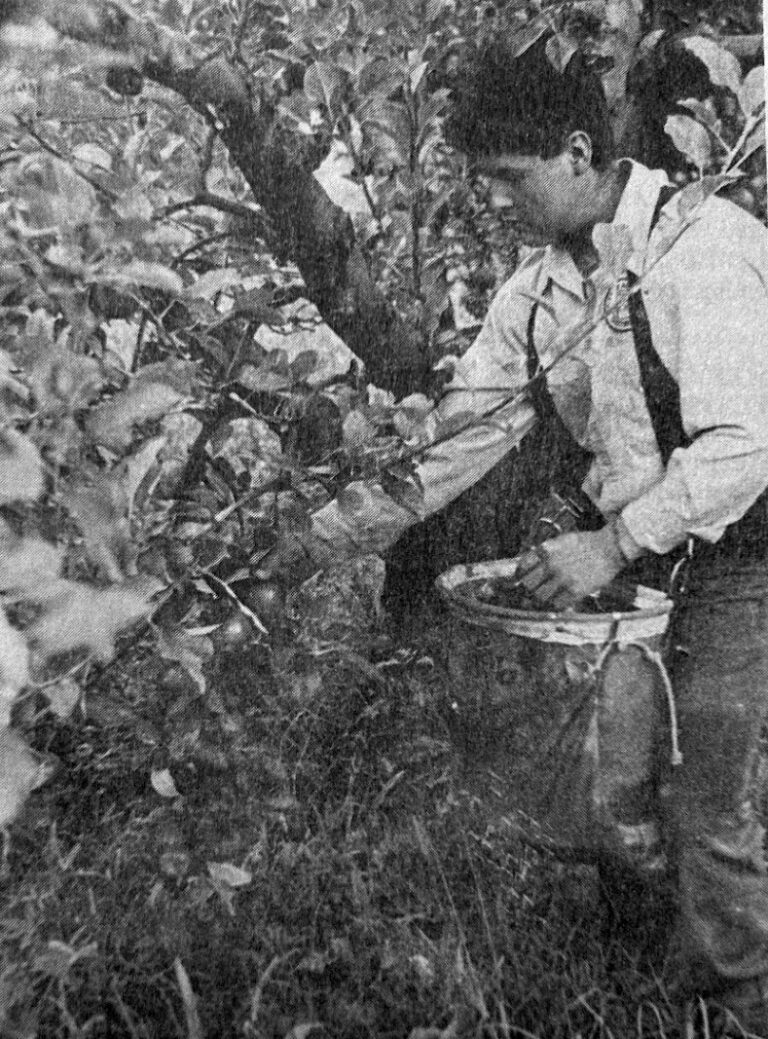Through the Years, Sept. 10

50 years ago
Sept. 17, 1975
— TOURIST INDUSTRY STILL HAS OZARKS GROWING ROOM
Tourism in the Ozarks is growing by leaps and bounds….despite agency restrictions that seem to hinder advancement from every angle. So says Don Heter, executive director of the Ozarks Playgrounds Association. Heter made his remark at the Cassville Rotary Club luncheon last week. He also added the OPA area of Missouri and Arkansas with all they have to offer have just scratched the surface in tourism possibilities. Heter told the Rotarians there were an estimated 27,192,000 persons who visited the Ozarks of Missouri and Northwest Arkansas last year. He threw out this figure and challenged Rotarians of the Table Rock Lake and Roaring River State Park area to come up with a figure this might have been had more promotion efforts been extended. Tourism in the state provided 197,000 jobs during this past summer, which represents about eight percent of the state’s workforce. Speaking from payroll position, Heter reminded his audience tourism is an industry, without smokestacks. “Think of it this,” Heter said, “the U.S. government figures there were $61 billion spent in the nation the past year in travel and tourism. This figure by 1980 has been projected to $127 billion. Those who are ready for this business with facilities, attractions and promotions to get their part of the business should more than double their tourism income.” While most organizations are doing a good job of promoting, most are not scratching the surface in doing an adequate job of selling their area’s features over another.” Heter said surveys of the OPA and information gained in sport and travel shows indicated people are staying longer in one place and then branching out view attractions of an area. The price of travel makes this adjustment necessary, he concluded. Heter said one of the biggest drawbacks of tourism is the industry suffering from decisions coming from about every agency in government these days. “Each time a change of policy comes from any government agency, it affects tourism, something of which we in promotion or living in the areas must become more aware. The director said a decision by the OPA board of directors will be made September 28 on the site of the annual meeting next March. Cassville had invited the organization to hold the sessions here. Serving on the board of representatives of Cassville, are Truman Baker and Bill LeCompte.
— CIRCUIT COURT ROOM PROJECT SEEKS $46,694
Barry Countians might be able to hear proceedings in their circuit court room if a County Court requested funding of $46,694 in funds from the Missouri Council on Criminal Justice is approved. That amount of money has been requested by the court to remodel the spaces. In the bargain, the county would gain additional office spaces by closing the high ceiling of the court room and extending a balcony to make a second floor space. Breakdowns on the project according to County Clerk Howard Bounous is $23,494 for the actual court room remodeling, which includes $11,700 for air conditioning An additional $23,200 would make the lowering of the ceiling of the spaces adequate for upstairs use as offices. Presiding Judge Nolan McNeill said many projects of this type have been accomplished throughout Missouri through the use of MCCJ funds, a federally funded agency. Plans for the Barry County project were designed by a Springfield architectural firm
40 years ago
Sept. 18, 1985
— SOIL DISTRICT JOINS GROUP CONCERNED ABOUT TAX USAGE
Barry County’s Soil and Water Conservation Group has become a member of the Districts United for Forage and Grass. The organization includes 40 SCS districts in Missouri which are concerned about the allocation of funds from a state soils sales tax being equally distributed in the state. Group spokespersons in meetings in Texas county last week said, “A commission that oversees the allocations has made it virtually impossible for south Missouri farmers to benefit from the tax.” The tax, starting this summer, benefits both the soil and water conservation efforts and state park system. People involved in the DUFG, said Missouri was rewarding “land abusers” by making more funds available to farmers with land problems, mainly those located north of the Missouri river.” Marvin Grandy, conservationist with the Barry County district, acknowledged this week that the board of supervisors, has agreed to become part of the DUFG. A principal part of the organization’s efforts will be to get “representation on the five-member commission from southern Missouri.” Members of the county board include presiding Judge Lloyd Dilbeck, Larry Morrison, Emmett McCord, Kenny Williams and Quentin Epperly. People involved in the program said they didn’t want to get into a situation of north Missouri against south Missouri, but the entire regional areas in the south were responding to the situation. Roland Kane, a district director with the Missouri Association of Soil and Water Districts, said in Houston last week, “None of the members have any knowledge of the soils and grasslands in south Missouri.” One purpose of the DUFG is encouraging Governor John Ashcroft to appoint new members to the panel. Publicity and concern about programs involving the new state sales tax, first surfaced in the Texas county session. Apparently, previous contact had been strictly through soil district offices. To date, just under one half of the state’s 111 districts are part of the concern group. Grandy told the Democrat this week the concern of the group is obviously shared by this region, with the decision to become part of the movement to get south Missouri more recognition in program plans. About $35,000 in state bond money has been used by SCS to assist in ASC allotments for croplands, mainly alfalfa, with the federal agency expended all funds; full-time secretary for the county office; low interest financing on practices and local money match. Grandy said the program as it exists, makes projects here difficult to qualify. Soil loss on cost share in instances of grasslands, is slight, making projects hard to qualify for assistance. “That’s the problem DUFG is bringing to the public’s attention,” Grandy said.
— PURDY HEARS TEST RESULTS
Purdy’s board of education heard a report in their last meeting covering BEST Test results for the district’s eighth graders. Superintendent Richard Place and principal Mark Fickie reviewed the report. In the reading portion of the test, 100% of the district’s eighth graders passed, compared to a statewide average of 95.6 per-cent. In math and government economics the district posted a result of 89.2 and 94.4 percents, compared with the state average of 83.4 and 86.6. Covering all three subtests, 86.1 percent of the Purdy eighth graders passed, compared to 77.1 percent throughout Missouri. Dr. Place also reported an 11 percent increase of the district’s enrollment since the opening day. Due to elementary school growth, additional personnel and classroom space would become necessary in the near future. Next scheduled meeting of the board is Monday, October 14.
— GRAPE VINE COLLECTORS SUBJECT TO FINES
Mark Twain National Forest officials, and agents of the Missouri Department of conservation as well, are concerned about the prospects of increased gathering of grape vines from Mark Twain National Forest lands and lands within Missouri. According to Cassville District Ranger Paul Johnson, a problem be brewing and local residents could find themselves in violation of the law. Evidently an individual from the Springfield area has traveled to a number of Missouri communities, engaging persons to gather the vines and bring them to a central collection point to be paid for them. The vines are apparently being used to make decorative wreaths and vine baskets. Grapes produced by the vines growing in the wild are an important wildlife food helping to sustain many wildlife species from late summer far into the winter. Hundreds of people going into the Forest to gather the vines could cause serious depletion of this important food source and permanent damage or death of the plants. For many years some local residents have gathered grapes from the vines to make homemade grape jelly and this has been considered a legitimate recreation use by the Forest Service. Some residents have also gathered vines in the past for home craft projects. Johnson says that because of the potential damage that could be caused by commercial gathering of the grape vines, the gathering of vines from National Forest land for any purpose including home crafts will have to be stopped. Gathering of the vines on National Forest lands is a violation of Secretary of Agriculture’s Regulation 36 CFR 261.9(b).Maximum penalty upon conviction of this offense is six months in jail, a $500 fine or both.
30 years ago
Sept. 13, 1995
— EVERYDAY HEROES
Putting Band-Aids on scraped knees, applying ice packs to bumped heads and caring for the health needs of Cassville kids has been Joana Smithson’s job for the past 30 years. As school nurse, Smithson sees about 100 to 150 students a day in her small, two-room office. She cares for students in kindergarten through 12th grade. A CHS graduate herself, Smithson joined the school district staff in 1965 when her daughter, Judy, entered the first grade at. Cassville. She said the only other person who was here when she began and who still works at the school is Edna Meryl Painter “I guess that makes me the grandma of the campus,” Smithson said. “I don’t feel old, and I don’t feel like I’ve been here 30 years.” During our 30-minute inter-view, Smithson rewrapped a sprained ankle, administered medicine to at least four students and took care of a little girl with a headache. She said her office is always busy. Her easiest days are the days when students are doing something special in class and don’t want to miss. “A lot of kids who are really not hurt or sick like to come see me,” Smithson said. “I guess they just need a little attention.” According to co-workers, Smithson is good at giving kids the attention they crave. “Joana is so faithful,” said Verlee Roark, third grade teacher. “She is gentle with the children and always listens. She is a very loving and caring person.” “She is one of the most helpful people I have ever worked with,” said Martha Dunnam, elementary school principal. “She has a deep commitment for helping children. She tries her very best to get to know the families, call the children by name and make the faculty aware of health concerns so that children are safe at school.” Smithson was born near Washburn but moved to Cassville when she was 10 years old. She grew up on the Rowley family farm, which was located where Wildwood Estates is now. After graduating from Cassville High School in 1952, Smithson went on to complete her nurses training at Springfield Baptist Hospital in 1955. She later attained her bachelor of science degree in nursing from Drury College. Before becoming a school nurse, Smithson worked in surgery, traveled with the American Red Cross, and worked at a private physician’s office and the Barry County Health Department. Over the past 30 years, Smithson has seen many changes at school. “I remember when we didn’t worry about head lice and didn’t worry about AIDS,” Smithson said. “I also have seen a tremendous change in family structure. There has been a definite break-up of family life.” When asked what she has enjoyed most about her job, Smithson quickly answers: “helping kids.”
— IT’S APPLE HARVEST TIME AT VOLLENWEIDER ORCHARDS
Cooler temperatures this past week are bringing out the color in area apple orchards. John Vollenweider, owner of Vollenweider Orchards in Exeter, said he is optimistic about this year’s apple crop. He is estimating that the local orchard will produce about 150,000 bushels of apples this year. “For the acreage we have now, it’s a good crop,” Vollenweider explained. In the past year, the Vollenweiders reduced their acreage from 350 acres to 200 acres of bearing trees. They took out old trees and will begin replacing them this spring. Crews have been picking and packing Jonathons since last Wednesday. Vollenweider said he currently has 175 workers on the payroll. At the peak of the season, there will be about 230 employed. Golden Delicious and Red Delicious varieties will be ready for picking in about a week and half. Sunshine combined with cool weather will help the apples develop “good color,” according to Vollenweider. “This has been an excellent year except for the weeks of extremely hot weather,” Vollenweider said. The hot weather and droughtlike conditions in August caused some apples to drop early from the trees. A lot of these apples were salvaged and used for apple juice. Some were just lost. Vollenweider said last year’s crop was a third of this year’s due to early frosts. Currently, there are about 4,000 bushels of apples picked daily. When the season peaks in about two weeks, there will be 12,000 bushels picked a day. The orchard will also produce Rome apples. They will come off the tree in mid-October. The orchard should finish packing by the end of December. About 85 percent of the local apple crop is shipped to destinations all over the United States and exported to Europe, Puerto Rico and South America. About 10 percent of the apples are diverted to juice, and 5 percent are sold through the orchard store. The Vollenweiders have been in the apple business for four generations. The late Carl Vollenweider, a Swedish immigrant, started an orchard in 1910. His son, the late Fred Vollenweider, bought the Exeter orchard in 1946. Now John and his son, Mark, manage Vollenweider Orchards together.
— SURPRISE LETTER
Amanda Ennis, a third grader at Eunice Thomas Elementary School in Cassville, was surprised on Sept. 12 when she received a letter and autographed photo from President Bill Clinton. The correspondence came after Amanda sent Clinton a. book she had written about her feelings and thoughts regarding the office of the President. Amanda is the daughter of Steve and Joyce Ennis of Cassville.






